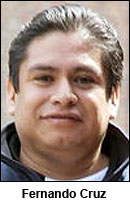OPINION
Fast-food employees deserve decent pay, dignity at work
 By FERNANDO CRUZ
By FERNANDO CRUZ
“Dad, why do you work so much?” my daughter asks when I play with her. “Don’t go.”
I don’t really have a choice. I have to work 10 or 12 hours per day at a Seattle fast-food chain, just to cover the bills and pay for food.
“You don’t have to earn any more, just stay home with me,” my son pleads as I head out the door.
I wish I could tell them the truth, but they’re just kids. They don’t understand why I’m not around as much as I wish I could be.
I’ve worked at the same fast-food restaurant for five years. In all that time, my hourly wage has risen 50 cents. That’s why I was one of hundreds of Seattle fast-food workers who went on strike on May 30: to fight for a raise, to demand respect and dignity.
I like my job. I get to meet all different kinds of people because I work at the front of the business rather than behind a desk. There’s one young man who has been coming to my store the whole five years I’ve worked there.
I know his order so well I can start preparing it before he even walks past the door. I’ve been able to watch him grow into an adult, and even met his father.
But I have children of my own, and I would not earn enough to take care of them if I worked only eight hours a day at the restaurant. When I needed to buy a car a few years go, I had to take on another job in construction. Between the two I worked 16 hours per day, five days per week for two years.
You can’t get that time back.
But you should at least get paid for it.
On July 24, workers from different fast-food chains filed criminal complaints with the Seattle Police for wage theft, including missed breaks, working off the clock and other issues. I was glad to see that the city is taking this crime seriously, because it’s a serious issue.
I know because the owner of my restaurant didn’t used to pay me time-and-a-half when I worked more than 40 hours a week. It’s just one more example of how wage theft happens all the time to fast-food workers.
I support the complaints but I did not file one myself because after the strike, I finally started getting time-and-a-half pay when I worked overtime. We need the government and the police to help us enforce the law, and we also need to do things like strikes to help make a change.
More than 30,000 people in the Seattle area work in fast food, and it’s one of the fastest-growing job markets around. We are the faces of large corporations like McDonald’s, Burger King, Taco Bell and Subway, but these corporations do not recognize the importance of what we do.
I was uncertain and a little fearful when we were striking outside of my store, but I also felt I had to share my experience in a way that people would listen.
It was really my first opportunity to do something to make my job better.
After we went on strike, many customers have told me over the counter that they supported us. Some were surprised — usually customers come, buy their food and leave, without giving any consideration to who works in these jobs.
But now they know that we are neighbors, friends and family. And now they know something has to change so workers like me can win a life of dignity for ourselves and our families.
Fernando Cruz works in a fast-food restaurant in Seattle and lives in Lynnwood. This column, which was published in The Seattle Times, is posted here with the author’s permission.





